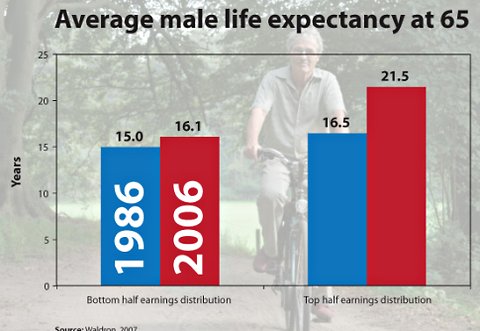A controversial subject at any level. Just a few points about they why's of there being so many people in the "retirement"sector of our population. Why the national debt has grown so rapidly, and why the entire pension part of retirement is so deeply underwater. Obviously open to what others may see, but a snapshot that I see from having lived through the years that began the problems.
.......................................................................
In the 1950's it was common to hear "if you can't make it in business, go into teaching". The pay scale was low.
Through the next 20 years, teaching continued as a low paying positions, augmented by contract improvements for vacation, hours and most importantly, pensions.
Similar situations in the auto industry, and in municipal positions such as fire departments, police departments and some public works.
In many cases, this allowed long term employees to retire with pensions in as little as 25 years, meaning more and earlier retirees... (compared to the years before 1950, when most pensions did not begin until retirement age (60 to 65).
So, many public employees could retire with pensions as early as age 50.
In many cases, lucrative union contracts allowed final pensions to not only include Cola's, but pension payments based on the final year of work wages, rather than averages or the total employment averages.
A case in point: a friend who retired at the same time a I did, in 1989, was sergeant on the Chicago Police force, shared with me that during his final year on the force, he was allowed... encouraged to not only work regular hours, but as much overtime as he could handle. In fact, he averaged more than 60 hours over the final year, boosting his pension based salary by 50%. I don't know the actual amount of his pension, but in 1989, when we both retired at the same time, his pension was more than $80,000... a lot of money even now.
Also... same time, a neighbor teacher friend retired at age 53, with a $53,000 pension.
One more... same time... Canadian neighbors, husband and wife, who had worked at both Ford and General Motors retired at age 56, with $104,000 in (total) pensions.
So here's the point that I see. Of course YMMV, but these pension increases were paid in lieu of wage increases. It was easy to do. The money didn't come out of profits, and the cost could be pushed down the road, to be paid for out of future revenues. The current Pension shortfall in the United States is 2.5 Trillion Dollars. The Fund manager didn't have to answer for this shortfall, nor did the government officials who allowed it to happen. In Chicago alone, the Teachers Pension Fund is $800 Billion below its' obligations.
All of these people, and many more, including many US Military have retired early under contractual agreements.
In a non similar situation, the Social Security deficit was also easily avoided by politicians who refused to equalize the obligations along the way, as well as using (as was and is legal) the funds to finance current obligations.
Just as we borrow to finance "quantitative easing" so too have we been borrowing to avoid paying for necessary increases in Social Security payouts.
...............................................................................
Neither the Social Security, nor the Pension Plans were designed to "kick the can down the road".
From a regulatory standpoint. A failure
From an oversight standpoint. A Failure.
From the corporate standpoint. A success, as the taxpayers will support the unregulated failure of their defaulted pension plans.
.................................................................................
The current solution appears to be:
Cut Social Security.
1. Let the government (Taxpayers) pay for the underfunded Pensions. Not legal, YET!
2. Leave those persons who were honest in their payments into the system, and believed what they were told... Leave them out in the cold.
What in the world ever prompted them to think that their contract with the Government "entitled" them to anything.
..................................................................................
I don't have a personal axe to grind here. I think that DW and I are safe enough for what we expect will be our four or five more years of life. this is not intended as a political statement, as it matters not Republican or Democrat.
It's more of a throwback to what we learned as kids. You pay for what you expect out of life as you go along, and don't dump the expense on the next generation... and yet, that's just what happened, when no one was looking.

